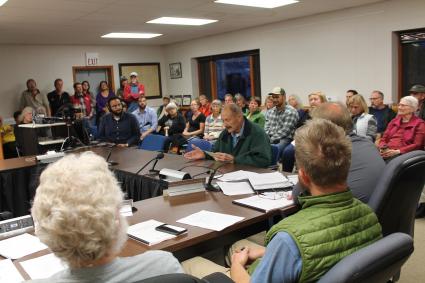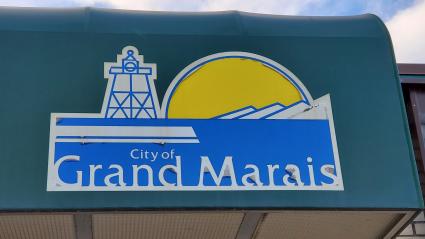Standing room only for public comment on city trees
Approximately 50 people crowded into Grand Marais City Hall at the Wednesday, October 9 city council meeting to share comments and concerns about the removal of the elm trees that line Highway 61 through the city. The trees are slated to be cut down in November 2019 in advance of the 2020/2021 highway reconstruction project. Seventeen people spoke during the public comment meeting, which lasted more than an hour.
One of the first speakers was retired forester Jim Hane, who said no one wants to stop the project. [44] He said the stormwater work was particularly important to stop the flooding of downtown streets. However, he appealed to the city to find a way to change the route of infrastructure and the bike path. He said the trees are important to the community.
Another longtime resident reminded the council that the elm trees were planted by community ancestors. A citizen who moved to Grand Marais in 1982 said the elm trees are like a “welcome wagon” to newcomers.
Three people spoke in favor of the project. Jim Boyd, the Cook County Chamber Director, was met with laughter from the audience when he said the trees were not healthy. City councilors cautioned the audience to listen respectfully, whether they agree or disagree with the speaker.
Boyd urged the city to move ahead with the Highway 61 reconstruction, stating that the amenities would bring a unique look to the city.
Another person in support of the project spoke of the value of the amenities planned for the highway corridor and said there are valid reasons – such as the Minnesota Pollution Control Agency’s cleanup of contaminated soil in a large section of the project.
Grand Marais business owner Jan Sivertson said she was very sad to see the trees go, but said for the benefit of the project, they need to go. She too, spoke of the aesthetics, which she said had been considered at “many, many, many meetings.” She thanked the council, MnDOT officials and others involved for all their hard work. [3:24]
Jim Raml of Seagull Lake, a longtime advocate of saving the trees, prefaced his comments by saying he thinks this is a lost cause. Despite that, he made an impassioned plea to at the very least, delay the cutting of the trees.
He expressed frustration that the Minnesota Department of Transportation had never come up with alternatives for the project, to give the public a chance to weigh in on other possible routes for infrastructure and for the bike path.
Raml also asked city councilors if they knew that more trees were coming down – along the bike path past the Grand Marais Municipal Campground. [5:07]
Three citizens shared concerns about the cost of the project and the fact that when the bids came in, the city had to accept a 300 percent increase. One citizen said she has had a lot of work done personally by contractors and she can’t understand what sort of contract allows such cost over-runs. [6:04]
A young man who is living with his family in the Grand Marais Campground brought some in the audience to tears when he spoke about the difficulties his family has faced finding a home in Cook County. He spoke of his ties to the community and how badly they want to stay here. He talked about the changes to the community starting with the Native Americans who were stewards of the land, to the fur trade, the loggers and now the tourism industry. He said more important than the trees are the people who are struggling to live in this area. He urged the city and its citizens to put as much energy into affordable housing and living wage jobs as they have for saving 11 trees. [7:22]
There were many more comments, some tearful, and many questions.
For the most part, the council listened silently, although Councilor Kelly Swearingen answered questions about the project cost by saying that the council had addressed the increased costs at their last council meeting. She encouraged the public to review the YouTube video of the last council meeting to learn more.
After public comment, the council moved on to other business on the agenda, not beginning council discussion of the trees until 9:30 p.m., not 7:30 as anticipated on the agenda.
And although there was a long wait as the city handled that other business, 18 people stayed to hear the council discussion.
Councilor Craig Schulte explained that he wanted the topic on the agenda because he struggles with what he has heard from MnDOT, more so in its treatment of local businesses than in the removal of the trees. He expressed frustration that MnDOT had not conducted an economic impact study for the project.
And, Schulte said, he wanted to give people a chance to air their concerns
He and his colleagues expressed frustration over what they’ve heard from MnDOT. They had questions about the MPCA dig and the monitoring wells; about the increased costs; about what it would cost to make changes at this point and more.
Councilor Kelly Swearingen pointed out that the elm trees are in MnDOT’s right-of-way. She said she didn’t want additional costs placed on citizens of the city for possible changes. [9:30]
Councilor Tim Kennedy expressed concern if any changes were made, the whole project would suffer. He likened the matter to dominoes, noting that small changes could lead to derailing the entire project. [10:37]
Mayor Jay Arrowsmith DeCoux suggested that the city contact MnDOT and ask if anything could be changed at this point. Arrowsmith DeCoux said he would call MnDOT project manager Michael Kalnbach and ask some questions, although he said he believed he knew what their answer would be. [12:05]
City Administrator Mike Roth cautioned that any changes to be made should be shared with the people who came up with the plan, a work of about six years.
Councilors finally agreed to have the mayor speak with MnDOT, but Councilors Kennedy and Anton Moody said they see little way to stop the project at this point without major financial repercussions to the city.
Mayor Arrowsmith DeCoux reiterated what Councilor Kennedy said about the longevity of the Highway 61 project. [14:14]
Tweet







